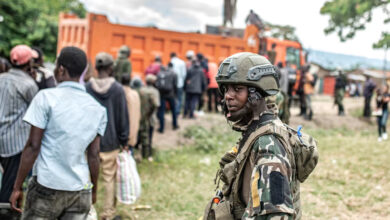When Afghan President Hamid Karzai and international leaders meet in London this week to muster international support for Afghanistan, they would do well to discuss how to deliver a modicum of justice and redress to the victims of both past and ongoing human rights violations in that country.
Impunity has been a key ingredient in the seemingly endless cycles of violence that have shattered the lives of countless Afghans. It is part and parcel of the ills of graft and corruption, of those failures of governance and of the rule of law that the London conference is meant to address.
As the power and greed of warlords, war profiteers and war criminals have remained largely unchecked, and institutions of government continue to be weak, even the modest human rights gains achieved in the last eight years are under threat. Last year’s elections, which were a cause for hope, were marred not only by insurgent violence and fraud, but also by heightened pressures on freedom of expression, on political participation, as well as by a severe backlash against women’s rights.
Today, most Afghans consider themselves victims not just of conflict but of lawlessness–a pervasive climate of impunity that condones routine “low-intensity” abuse and gross human rights violations alike.
Injustice and human rights violations are neither accidents of fate nor unchallengeable occurrences. They are rather the blatantly violent and unmitigated manifestation of how roles are structured, how resources are allocated and used, and how power is distributed in Afghanistan. If abusive decision-makers and power-brokers remain above the reach of the law, exploitation, deprivation, marginalization, and discrimination will be further entrenched.
Justice, including social and economic justice, cannot be achieved until abuse, discrimination, and inequity in all their forms are addressed and curbed.
Against this background, it is not surprising that disillusionment in the “democratization” process is deepening and spreading. Distrust of models of governance perceived as at odds with Afghan societal and individual aspirations is mounting. Government structures are widely regarded as undemocratic, unfair, and unable to deliver the most basic services or the most fundamental protection.
The Taliban and other armed opposition groups have benefited from this situation in terms of their ability to both intensify their military effort and to organize parallel systems of governance which attract or coerce desperate and disillusioned communities into their camp.
Measures must be taken to reverse current trends. To begin with, a just and stable Afghanistan demands acknowledgement of, and building on, the many positive features of Afghan society, on its resilience and on the desire of ordinary people to live in safety and dignity.
This can only be achieved by mobilizing political will and international support to promote and protect human rights. The rule of law must be reflected in credible institutions of governance expressing a genuine compact between the Afghan people and those in positions of power.
But national reconciliation, viable institutional reforms and durable stability will require mechanisms empowered to establish the truth regarding abuses, combat impunity and offer victims justice and redress for their suffering. Accountability and reconciliation mechanisms should be put in place according to international norms and standards. They must reflect the aspirations of the Afghan people. These mechanisms should be used to weed out corrupt and abusive practices and the perpetrators of human rights outrages that are holding Afghanistan hostage to its past.
For too long, the voices of Afghan victims, and the views of women and minority groups, have been suppressed or ignored. What is needed at this critical juncture is a revamped framework of engagement that is inclusive of a broad and representative range of Afghanistan’s diverse communities, including women, minorities and victims of human rights violations. Such participatory forum must empower all contributors to freely express their views and voice their concerns and recommendations without fear of retaliation. It must be sustained over a long period of time rather than being a single event that will be quickly forgotten once the glare of the media dies down.
Afghan leaders and their international partners are urged to foster an environment in which issues of accountability, transparency and genuine participation remain a priority in the agenda for peace and reconciliation both now and in the future.
This article is published courtesy of the United Nations.




